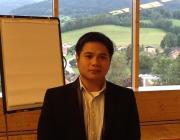Yesterday, I asked my students what they did during the Christmas break which they did for the first time? A male student shared how it was the first time he smoked with his mom, a female student shared how it was the first time she drank alcohol with her father and how her father always kept her glass full with beer. A petite female student shared how it was her first time to attend her high school reunion and how she drank with her batchmates from 9pm to 7am in the morning. Another student shared how it was his first time to sleep in the sunken garden. Another shared how it was her first time to eat crocodile meat (which tastes like pork), eat blowfish with her dad before the prophesied end of world in December 2012, and eat the delicious woodworm called 'Tamilok'. Another shared how it was the first time he was able to eat 'Morkon' and go home alone in early dawn. Another said it was his first time to out of the country alone, and another said how it was the first time she gave her brother a gift. Another student simply shared how it was his first time use Windows seven.
After the sharing, I asked them how my zen teachers tell us that every experience really happens for the first time because each occasion and situation is unique. The same conditions for the same experience, e.g. our discussion and dialogue, may never happen again.
I told them how our views of what counts as a 'first time' becomes significant in itself because everything is in some way a first time and the fact that they were able to identify those experiences as a 'first time' tells something about themselves.
"So, does that mean that I am always a virgin no matter how many times I have sex with someone." I said that you can always make love with a person and make that person feel special with your whole being as if it were your first time.
"Are there first times that we experience only for one time?" Another student asked.
My quick answer was "death". Our experience of death is the first and the last.
But another student added "maybe our experience of everything is always the first and the last.
I agreed. If we are truly mindful of the ordinary things we take for granted, we will realize that everything is special and warrants appreciation and delight. This zen experience of mindfulness, of being refreshed by ordinary things we take for granted by being fully there in the doing of it, is similar to western philosophers' experience of philosophical wonder and astonishment. Bertrand Russell for example talks about how philosophical liberation consists in moving from a world that is confined in a 'self' as extended in our customs and conventions to a world where we are united with the 'not self' and we become citizens of the universe. Both enables us to see things anew as if it were the first time.
An architecture student added how they see things anew because of acquiring an architecture's eye. After what they learned in their Architecture class, they also come to notice a building's minute small cracks. Those cracks were already there, but they failed to notice it because they did not have a trained eye.
Seeing something new because of new knowledge is like slowly seeing a building through the newly acquired architecture's eye . We see different things in the world because we have also changed. The world world did not change. The cracks were already there, but we are now able to see it because we are able to attune ourselves to the world to see things differently and appreciate things we previously took for granted. And this 'seeing things anew' is possible through the practice of meditation and mindfulness. Such a practice trains us to see each moment as special as if it were the first and the last.
Philosophical discussion in class should likewise be mindful and meditative. The use of pure logic does not always help because we have so many intellectual defense mechanisms. It also becomes an excuse to be inauthentic. One says things one does not really believe in simply because they are logical and they conform to what the majority finds logical. Oftentimes, it is useful to say what we feel because those intuitive remarks often contain reasons that make sense. Being authentic means thinking from ones being. One uses the heart as well as the mind, and is brave enough to acknowledge inconsistencies that occur within. Others' ideas become corrective only because they articulate things we already acknowledge in ourselves. But it is only us who really know ourselves and there are things we do not say or things we still do not yet have the words for. So we listen to ourselves, and take on the anxiety and wonder that comes with dull moments. If the discussion is right, they are pregnant silences, a form of happy stillness in being fully there at that special moment.
Ironic. This discussion happened during my 'first meeting' of the year in my 'last' class for the day.
Lumberto G. Mendoza
Associate Professor, UP Diliman Department of Philosophy
CSSP Pavilion 2, UP Diliman
Quezon City, Philippines
Contact
